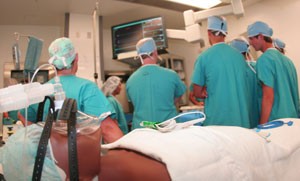About 50 Arizona high school students had an opportunity to participate in “”mini medical school”” at UA’s 16th annual MedCamp.
The event, held July 14-17 at a variety of university locations, allowed students – all of whom were nominated by high schools throughout Arizona – to delve into a variety of medical-related experiences.
Students received tours of University Medical Center’s nursery, ICU, and operating rooms, and were able to participate in a variety of medical activities at locations like the Arizona Health Sciences Center.
“”We offer the students who come to MedCamp a gamut of activities-laboratory exercises, shadowing opportunities, lectures, tours,”” said Katie Riley, Medcamp director.
“”They see the hospital from top to bottom – from the nurseries to the morgue,”” she said.
Riley explained that most of the students involved in MedCamp are about 17 years old – a perfect time to start exploration into medicine, as students are not always sure precisely what they want to do with their college degree, but certainly have an opportunity to become interested in a variety of healthcare-related professions.
“”It’s a great opportunity for us to talk about the wonders of medicine, nursing and pharmacy,”” she said.
Students even had the occasion to blend their own anti-itch lotion with the help of a UA pharmacist, as well as perform a virtual autopsy at the UMC morgue.
To end the three-day adventure, an anatomist gave MedCamp students a hands-on introduction to the brain.
Because students only have a short time with MedCamp to “”get a taste”” of what really happens on a day-to-day basis in a hospital, Riley said that she often encourages students to take their learning to the next level by volunteering at their local hospitals as candy stripers or finding work in laboratories if they can find an available physician to assist them.
“”It’s just sort of an introduction,”” she said. “”I’m hoping they’ll take it to the next step.””









